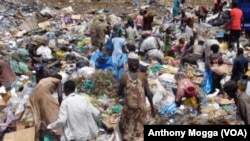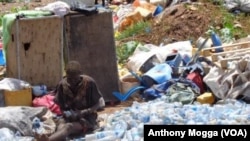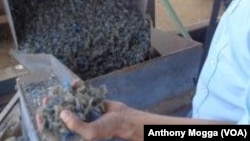JUBA —
Esther Keji picks through a sprawling pile of trash at a dump around 20 kilometers outside Juba, on the road to Yei.
This is how Keji makes a living. With the sun beating down on her back, she bends over and sifts through discarded rubbish -- everything from rubber tires to soda cans -- looking for plastic bottles.
Juba has a huge problem with plastic waste. Most people in the city drink bottled water and throw the empties out because there are very few recycling facilities. Estimates put the number of plastic bottles discarded in Juba each day at around one million.
"This work is really hard," 32-year-old Keji says as she picks another plastic bottle out of the massive pile that covers the equivalent of five football pitches.
Around her, dozens of others -- men, women and children -- do the same back-breaking, dirty work. The women and children used to sell the trash they collected to traders from Uganda and Kenya, who took the rubbish back to their country for recycling.
But for the past year, there has been another option: a local NGO, the Environmental Rehabilitation Program (ERP), pays the women by weight for plastic bottles they bring in for recycling.
ERP then takes the bottles, cleans them, separates the caps from the bottle, shreds the plastic and, when it has accumulated 20 tons of plastic, sells it to buyers from China, Congo and Uganda, who take it to their country to turn it into items like rope or synthetic fabric. ERP program advisor Olivier Snowden says recycling is important not just because it gives women like Keji an income, but also because it keeps plastic out of landfills.
"This type of plastic bottle was just invented last century, so nobody can tell how long it takes" to degrade, Snowden said.
"Experts say that it takes maybe a thousand years... If you put a bottle in the ground today, the grandchildren of your grandchild will find it there. It will not decompose."
ERP says it collects and recycles 50,000 plastic bottles, or around one ton of plastic, from the dump near Juba each day.
But even if the women like Keji who pick through the trash at the dump were to collect twice or three times that amount of plastic, they would still be collecting only a fraction of the one million bottles that are said to be thrown out daily in the South Sudanese capital.
This is how Keji makes a living. With the sun beating down on her back, she bends over and sifts through discarded rubbish -- everything from rubber tires to soda cans -- looking for plastic bottles.
Juba has a huge problem with plastic waste. Most people in the city drink bottled water and throw the empties out because there are very few recycling facilities. Estimates put the number of plastic bottles discarded in Juba each day at around one million.
"This work is really hard," 32-year-old Keji says as she picks another plastic bottle out of the massive pile that covers the equivalent of five football pitches.
Around her, dozens of others -- men, women and children -- do the same back-breaking, dirty work. The women and children used to sell the trash they collected to traders from Uganda and Kenya, who took the rubbish back to their country for recycling.
But for the past year, there has been another option: a local NGO, the Environmental Rehabilitation Program (ERP), pays the women by weight for plastic bottles they bring in for recycling.
ERP then takes the bottles, cleans them, separates the caps from the bottle, shreds the plastic and, when it has accumulated 20 tons of plastic, sells it to buyers from China, Congo and Uganda, who take it to their country to turn it into items like rope or synthetic fabric. ERP program advisor Olivier Snowden says recycling is important not just because it gives women like Keji an income, but also because it keeps plastic out of landfills.
"This type of plastic bottle was just invented last century, so nobody can tell how long it takes" to degrade, Snowden said.
"Experts say that it takes maybe a thousand years... If you put a bottle in the ground today, the grandchildren of your grandchild will find it there. It will not decompose."
ERP says it collects and recycles 50,000 plastic bottles, or around one ton of plastic, from the dump near Juba each day.
But even if the women like Keji who pick through the trash at the dump were to collect twice or three times that amount of plastic, they would still be collecting only a fraction of the one million bottles that are said to be thrown out daily in the South Sudanese capital.






